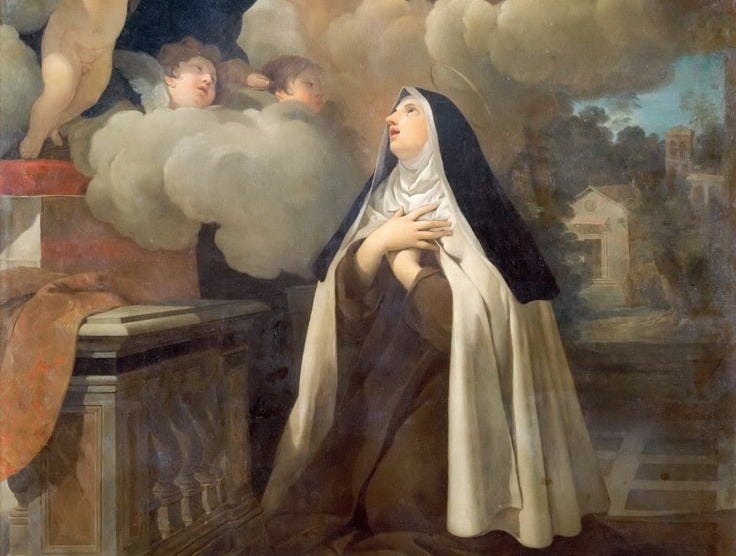St. Teresa and the Mansions, Part III: Mansions 4-5
“We render God the most true and acceptable service by caring only for His honor and glory and forgetting ourselves, our advantages, comfort, and happiness.” - St. Teresa of Avila
The Fourth and The Fifth Mansions correspond with the Illuminative Stage of the spiritual life. They are characterized by a more supernatural experience, one in which God brings the soul to “the prayer of the quiet” and “the prayer of union” through a mystical experience.
In the beginning of the spiritual journey, much of our own effort was needed, but our efforts will always be lacking until the Lord Himself comes to work in our soul. These two mansions have a more supernatural character, as it is more of God's action, and less of our own effort. In the first three mansions, our efforts were necessary, but our own efforts will always be lacking. Here, we make room for God. We dispose ourselves to listen. We quiet ourselves in order to be attentive.
The Fourth Mansions
There is a noticeable turning inward, a turning away from the world and growth in interior recollection. But this can only happen by way of humility, detachment, and being ‘quiet,’ that is, cultivating a disposition of listening; being attentive, ready to receive and respond.
St. Teresa, Interior Castle:
“As these mansions are nearer the King’s dwelling they are very beautiful, and so subtle are the things seen and heard in them, that .. the mind cannot give a lucid idea of them to those inexperienced in the matter.”
“Apparently a person must have dwelt for a long time in the former mansions before entering these; although in ordinary cases the soul must have been in the last one spoken of, yet, as you must often have heard, there is no fixed rule, for God gives when, how, and to whom He wills — the goods are His own, and His choice wrongs no one.”
As we get nearer to the King’s dwelling, the Mansions get more beautiful. ‘The mind cannot give an idea of them’ to those who have not experienced them, but ‘God gives when, how, and to whom He wills...’
There is something decidedly supernatural happening here, as God draws the soul in; a turning of the soul inward toward interior recollection. The Lord Himself is going to come now and work in the soul, in a supernatural way, that is His doing and not of our own effort.
St. Teresa warns that love is not based on a perfect prayer performance free of distractions but is about one’s desire and will:
“I wish to warn you that to make rapid progress and to reach the mansions we wish to enter, it is not so essential to think much as to love much: therefore, you must practise whatever most excites you to this. Perhaps we do not know what love is, nor does this greatly surprise me. Love does not consist in great sweetness of devotion, but in a more fervent determination to strive to please God in all things, in avoiding, as far as possible, all that would offend Him, and in praying for the increase of the glory and honor of His Son and for the growth of the Catholic Church. These are the signs of love; do not imagine that it consists in never thinking of anything but God, and that if your thoughts wander a little all is lost.”
She describes being drawn into a deeper prayer life by way of humility:
“Practise what I advised in the preceding mansions — humility, humility, for God lets Himself be vanquished by this and grants us all we ask.”
“If we are really humble and annihilate ourselves, not only in our imagination (which often deceives us), but if we truly detach ourselves from all things, our Lord will not only grant us these favors but many others that we do not know even how to wish for.
Prayer of the Quiet
St. Teresa explains “the prayer of the quiet,” which is initiated by God Himself and through no effort of our own. In fact, by “quiet” she means that we shouldn’t try to force it to happen. She explains:
“I think I read somewhere that the soul is then like a tortoise or sea-urchin, which retreats into itself. Those who said this no doubt understood what they were talking about; but these creatures can withdraw into themselves at will, while here it is not in our power to retire into ourselves, unless God gives us the grace.”
“I believe that human efforts avail nothing in these matters, which His Majesty appears to reserve to Himself, setting this limit to our powers. In many other things, such as penances, good works, and prayers, with His aid we can help ourselves as far as human weakness will allow.”
“The second reason is, that these interior operations being sweet and peaceful, any painful effort does us more harm than good. We should rather abandon our souls into the hands of God, leaving Him to do as He chooses with us, as far as possible forgetting all self-interest and resigning ourselves entirely to His will.”
“In my opinion, His Majesty only bestows this favor on those who have renounced the world, in desire at least, if their state of life does not permit their doing so in fact.”
“He thus specially calls them to devote themselves to spiritual things; if they allow Him power to act freely, He will bestow still greater graces on those whom He thus begins calling to a higher life. Those who enjoy this recollection should thank God fervently: it is of the highest importance for them to realize the value of this favor, gratitude for which would prepare them to receive still more signal graces.”
“In my opinion, when God chooses to place the soul in this mansion it is best for it to do as I advised, and then endeavour, without force or disturbance, to keep free from wandering thoughts. No effort, however, should be made to suspend the intellect and imagination entirely from acting, for it is well to remember God's presence and to consider Who He is.”
In this “prayer of the quiet,” our will is completely captured by God, even if our other faculties (intellect, memory, imagination) are still distracted.
This is not something we can force by our own power, but is bestowed upon us by God. Our attitude should be one of gratitude and humility, and we should remember that it means He is preparing us to receive more, if we will abandon ourselves into His hands and let Him do as He wills.
“In the prayer of quiet, when the water flows from the spring itself and not through conduits, the mind ceases to act; it is forced to do so, although it does not understand what is happening, and so wanders hither and thither in bewilderment, finding no place for rest. Meanwhile the will, entirely united to God, is much disturbed by the tumult of the thoughts: no notice, however, should be taken of them, or they would cause the loss of a great part of the favour the soul is enjoying.”
“Let the spirit ignore these distractions and abandon itself in the arms of divine love: His Majesty will teach it how best to act, which chiefly consists in its recognizing its unworthiness of so great a good and occupying itself in thanking Him for it.”
Summary of The Fourth Mansion
The soul is becoming more interiorly recollected, but this ‘turning inward’ is the work of God, not something it can do on its own without His supernatural grace.
Humility and detachment are absolutely essential to cultivate the right disposition to allow God to do His work.
For those who cannot physically leave the world (like those in the married state), it is enough to have the desire. “His Majesty only bestows this favor on those who have renounced the world, in desire at least, if their state of life does not permit their doing so in fact.”
Coming to a place of greater trust and surrender.
Abandoning oneself into the hands of God, leaving Him to do as He chooses. The soul cares only for God’s honor and glory and forgets self.
The will is entirely united to God, but the other faculties remain distracted. Do not let these distractions disturb you: “Let the spirit ignore these distractions and abandon itself in the arms of divine love.” - “No effort should be made to suspend the intellect and imagination entirely from acting, for it is well to remember God's presence and to consider Who He is.”
The Fifth Mansions - Union of the Soul with God in Prayer
These mansions seem to be expressed by a greater ‘death to self,’ a death in which the old man of sin (Adam) is cast off and the new man emerges (in Jesus Christ).
“Oh, my sisters, how shall I describe the riches, treasures and joys contained in the fifth mansions! If you would purchase this treasure of which we are speaking, God would have you keep back nothing from Him, little or great. He will have it all; in proportion to what you know you have given will your reward be great or small. There is no more certain sign whether or not we have reached the prayer of union.”
In the fifth mansions, there is greater conformity, greater surrender, greater abandonment. Not only is our will captured by God, but all of our other faculties as well.
St. Teresa explains this “prayer of union” which seems to overtake the soul to the point of depriving of it of the use of its faculties, but says this is infrequent and brief:
“In the prayer of union the soul is fast asleep, as regard the world and itself: in fact, during the short time that this state lasts, it is deprived of all feeling whatever, being unable think on any subject, even if it wished.”
“In fact, it has died entirely to this world, to live more truly than ever in God. This is a delicious death, for the soul is deprived of the faculties it exercised while in the body: delicious because, (although not really the case), it seems to have left its mortal covering, to abide more entirely in God.
The mind entirely concentrates itself on trying to understand what is happening, which is beyond its power; it is so astounded, that if consciousness is not completely lost, at least no movement is possible: the person may be compared to one who falls into a dead faint with dismay.”
“Let us now speak of the sign which proves the prayer of union to have been genuine. As you have seen, God then deprives the soul of all its senses that He may the better imprint in it true wisdom: it neither sees, hears, nor understands anything while this state lasts, which is never more than a very brief time; it appears to the soul to be much shorter than it really is.”
Next, St. Teresa employs the use of two wonderful analogies.
The Bride of the Canticles and the Wine Cellar
First, she describes this experience of a soul being drawn into the ‘prayer of union’ by comparing it to the Bride in the Canticles who is ‘brought into’ the wine cellar, not going of her own accord.
“Concerning my words: “We can do nothing on our own part,’' I was struck by the words of the Bride in the Canticles, which you will remember to have heard: “The King brought me into the cellar of wine,” she does not say she went of her own accord, although telling us how she wandered up and down seeking her Beloved.”
“I think the prayer of union is the ‘cellar’ in which our Lord places us, when and how He chooses, but we cannot enter it through any effort of our own. His Majesty alone can bring us there and come into the center of our souls.”
“In order to declare His wondrous works more clearly, He will leave us no share in them except complete conformity of our wills to His, and abandonment of all things: He does not require the faculties or senses to open the door to Him; they are all asleep. He enters the innermost depths of our souls without a door, as He entered the room where the disciples sat, saying, ‘Pax vobis,’ and as He emerged from the sepulchre without removing the stone that closed the entrance.”
The Silkworm
Next, St. Teresa uses the process of metamorphosis (a silkworm growing into a butterfly) as an analogy of how the soul grows and transforms in the spiritual life.
She shows that, though we can’t take an active part in the work of God within us, we do need to prepare ourselves to receive this grace. We ‘die to self’ to become a new creature, the same way a caterpillar ‘hides’ itself in a cocoon and emerges as a new creature. We ‘hide in Christ’ and die to self.
“For you are dead; and your life is hid with Christ in God.” (Col 3:3)
You have heard how wonderfully silk is made, in a way such as God alone could plan; how it all comes from a tiny egg.
“When, in the warm weather, the mulberry trees come into leaf, the little egg, which was lifeless before its food was ready, begins to live. The caterpillar nourishes itself upon the mulberry leaves, until, when it has grown large, people place near it small twigs, upon which, of its own accord, it spins silk from its tiny mouth until it has made a narrow little cocoon in which it buries itself.”
“Then this large and ugly worm leaves the cocoon as a lovely little white butterfly.”
“If we had not seen this, but had only heard of it as an old legend, who could believe it?”
“The silkworm symbolizes the soul which begins to live when, kindled by the Holy Spirit, it commences using the ordinary aids given by God to all, and applies the remedies left by Him in His Church, such as regular confession, religious books, and sermons; these are the cure for a soul dead in its negligence and sins and liable to fall into temptation.”
“Then it comes to life and continues nourishing itself on this food and on devout meditation until it has attained full vigor.”
When the silkworm is full grown ... it begins to spin silk and to build the house wherein it must die. By this house, when speaking of the soul, I mean Christ. I think I read or heard somewhere that our life is hid in Christ ... This shows, my daughters, how much, by God’s grace, we can do, by preparing this home for ourselves, towards making Him our dwelling-place, as He is in the prayer of union.
“The little we can do will hardly have been accomplished when this insignificant work of ours, which amounts to nothing at all, will be united by God to His greatness and thus enhanced with such immense value that our Lord Himself will be the reward of our toil.”
“Although He has had the greatest share in it, He will join our trifling pains to the bitter sufferings He endured for us, and make them one.”
Forward, then, my daughters! Hasten over your work and build the little cocoon. Let us renounce self-love and self-will, care for nothing earthly, do penance, pray, mortify ourselves, be obedient, and perform all the other good works of which you know. Act up to your light; you have been taught your duties. Die, die! as the silkworm does when it has fulfilled the office of its creation, and you will see God and be immersed in His greatness, as the little silkworm is enveloped in its cocoon.
Now let us see what becomes of the silkworm, for all I have been saying leads to this. As soon as, by means of this prayer, the soul has become entirely dead to the world, it comes forth like a lovely little white butterfly!
Oh, how great God is! How beautiful is the soul after having been immersed in God's grandeur and united closely to Him for but a short time! Indeed, I do not think it is ever as long as half an hour. Truly, the spirit does not recognize itself, being as different from what it was as is the white butterfly from the repulsive caterpillar. It does not know how it can have merited so great a good, or rather, whence this grace came, which it well knows it merits not.
Warnings
The graces of the Fifth Mansion are wonderful, but don’t get careless or complacent. Grace is calling you forward. You’re being prepared for more.
“If [the soul] receives the grace of union and then does no more, thinking itself safe, and so leads a careless life, wandering off the road to heaven (that is, the keeping of the commandments), it will share the fate of the butterfly that comes from the silkworm, which lays some eggs that produce more of its kind, and then dies forever.”
There is both great zeal and great restlessness in the Fifth Mansion:
“The soul desires to praise our Lord God, and longs to sacrifice itself and die a thousand deaths for Him. It feels an unconquerable desire for great crosses, and would like to perform the most severe penances; it sighs for solitude, and would have all men know God, while it is bitterly grieved at seeing them offend Him.”
“Oh, to see the restlessness of this charming little butterfly, although never in its life has it been more tranquil and at peace! May God be praised! It knows not where to stay nor take its rest; everything on earth disgusts it after what it has experienced, particularly when God has often given it this wine...”
If you don’t experience the gift of supernatural union with God, don’t despair.
“In spite of all I have written, there still seems some difficulty in understanding this mansion. The advantage of entering is so great, that it is well that none should despair of doing so because God does not give them the supernatural gifts described above. With the help of divine grace true union can always be attained, by forcing ourselves to renounce our own will and by following the will of God in all things.'
“What do you think, daughters, is His will? That we may become quite perfect and so be made one with Him and with His Father, as He prayed we might be. Observe, then, what is wanting in us to obtain this.”
“There is no need for us to receive special consolations from God in order to arrive at conformity with His will; He has done enough in giving us His Son to teach the way.”
Even if you don’t experience the mystical union described in the Fifth Mansion, you can still renounce your own will and conform to God’s will, following the example of Our Lord, Jesus Christ. That is enough to be united to God.












Recently I found Spiritual Theology by Fr. Jordan Aumann, O.P. (I think it is a textbook; I found it in the bibliography of a recent spirituality-for-regular-folks book by another author). Chapter 12 is the best summary of the stages of prayer by an organized person (no pun intended but sometimes it is nice to look at teresian and sanjuanist spirituality reorganized by a Dominican) that I have found and also has the best two-page spread (in the chapter somewhere) for spiritual directors of what someone ought to do to cooperate. Some of the theory is heavy going but gave me some moments of consoling thought about the Holy Spirit and how much he loves us. If you can borrow the book somewhere, have a look... it would be a bit steep to buy for one chapter (I did get a used copy and lent it to friends who have it currently so I have not looked at the rest of it.)